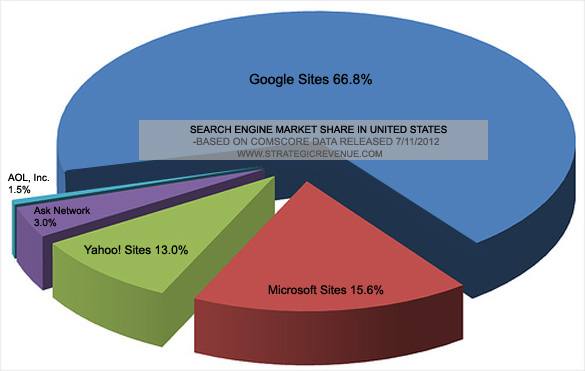Newly released figures from comScore, an Internet analytics firm, show Google’s dominant position to be a granite boulder against which weaker competitors can only grind futilely. Despite vigorous attempts by Microsoft, Yahoo and others to whittle away at the commanding share of Web visitors held by Google, the search king expanded its slice of the pie to 66.8 percent in June 2012, a significant rise from 65.5 percent in June of the previous year. Yahoo’s share slid to 13 percent, a full 2.9 percentage points down from June 2011, while Microsoft’s Bing picked up 1.2 percentage points to end at 15.6 percent.
The jump to a high-water mark for Bing comes after 25 consecutive monthly increases. Microsoft, which has locked horns with Google in multiple technology markets, also powers Yahoo’s search engine in a partnership with the smaller company. Combined share for both companies stands at 28.6 percent, a drop of 1.7 percentage points in a year.
Google’s muscular presence gives it considerable leverage in negotiating lucrative deals with marketers, many of whom are willing to pay top dollar for targeted advertising meant to draw the attention of especially profitable customers. However, a downside to rampaging across the Web is unwelcome attention from regulators, who see Google’s virtual kingdom as potentially anti-competitive. The Federal Trade Commission is currently investigating claims that the Internet powerhouse has been abusing its position to shove aside smaller firms in favor of Google’s own offerings.

Over the last couple of years, Microsoft has poured considerable resources into the Bing search engine in its fight to wrest market share away from Google and weaken a feared rival. After starting out strongly with an 8.4-percent share two years ago, Bing has steadily improved its presence at the expense of former search-engine leader Yahoo, also-ran Ask Jeeves and fading giant AOL. Yahoo’s fortunes have slipped steadily for the past ten months with the latest figures representing the lowest market share ever for the once vaunted Internet property.
In spite of creeping up in the rankings, Bing has been a disappointing battlefield for Microsoft. The software colossus’ online-services division has bled money since venturing into the shark-infested waters of search-engine advertising, losing a staggering $10.4 billion over five years. Company officials declared early in July that Microsoft would write off $6.2 billion on its Internet business activities. A near-total abandonment of the goodwill value of a $6.3 billion acquisition of aQuantive, an online-advertising services provider, accounted for almost all of the noncash bookkeeping charge.
Notwithstanding optimistic predictions by Kevin Johnson, former president of Microsoft services, the 2007 purchase of aQuantive fell far short of boosting the company into the first ranks of Web advertising providers. Microsoft had gambled heavily by paying an 85-percent premium for aQuantive’s stock after seeing other prospects snatched up by eager competitors.
In addition, Microsoft and Yahoo recently said in separate statements that their advertising partnership, launched early in 2010, had not proven as effective as expected. The joint effort was meant to unify disparate marketing efforts, increasing the attraction of a single advertising space to potential customers. Many industry analysts believe long-term profitability depends on capturing at least 25 percent to 30 percent of the search market, leaving Bing lagging badly in its quest for independent market viability.
In what appears to be an effort to “stop the bleeding”, hopefully overshadowing these latest figures, Yahoo announced last week that it had appointed 13 year Google veteran Marissa Mayer as Chief Executive Offer of Yahoo. Mayer, now 37 years old, was Google’s 20th employee. During her years at Google, Marissa has held numerous positions, including engineer, designer, product manager, and executive, and has launched over 100 well-known features and products and played an instrumental role in Google search, leading the product management efforts for more than 10 years, a period during which Google Search grew from a few hundred thousand to well over a billion searches per day. Marissa led the development of some of Google’s most successful services including image, book and product search, toolbar, and iGoogle, and defined such pivotal products as Google News and Gmail. She is listed as an inventor on several patents in artificial intelligence and interface design. This indeed is big news for Yahoo and there has been a flurry of speculation on what Mayer’s first order of business will be as CEO. Yahoo Shares rose shortly after the announcement.
As far as Microsoft and Bing is concerned, for now they’ve brought in popular PR professional Mark Penn who packed the massive punch behind Hillary Clinton’s, strong, yet unsuccessful presidential campaign back in 2008.
According to the Wall Street journal, Penn, who will report directly to Microsoft CEO Steve Ballmer, has said in an interview that he will be assembling what he calls a “SWAT team” to work on strategy around consumer projects with his “initial priority” focused closely on Bing.

About The Author: John Colascione is Chief Executive Officer of Internet Marketing Services Inc. He specializes in Website Monetization, is a Google AdWords Certified Professional, authored a ‘how to’ book called ”Mastering Your Website‘, and is a key player in several Internet related businesses through his search engine strategy brand Searchen Networks®

 *** Here Is A List Of Some Of The Best Domain Name Resources Available ***
*** Here Is A List Of Some Of The Best Domain Name Resources Available ***